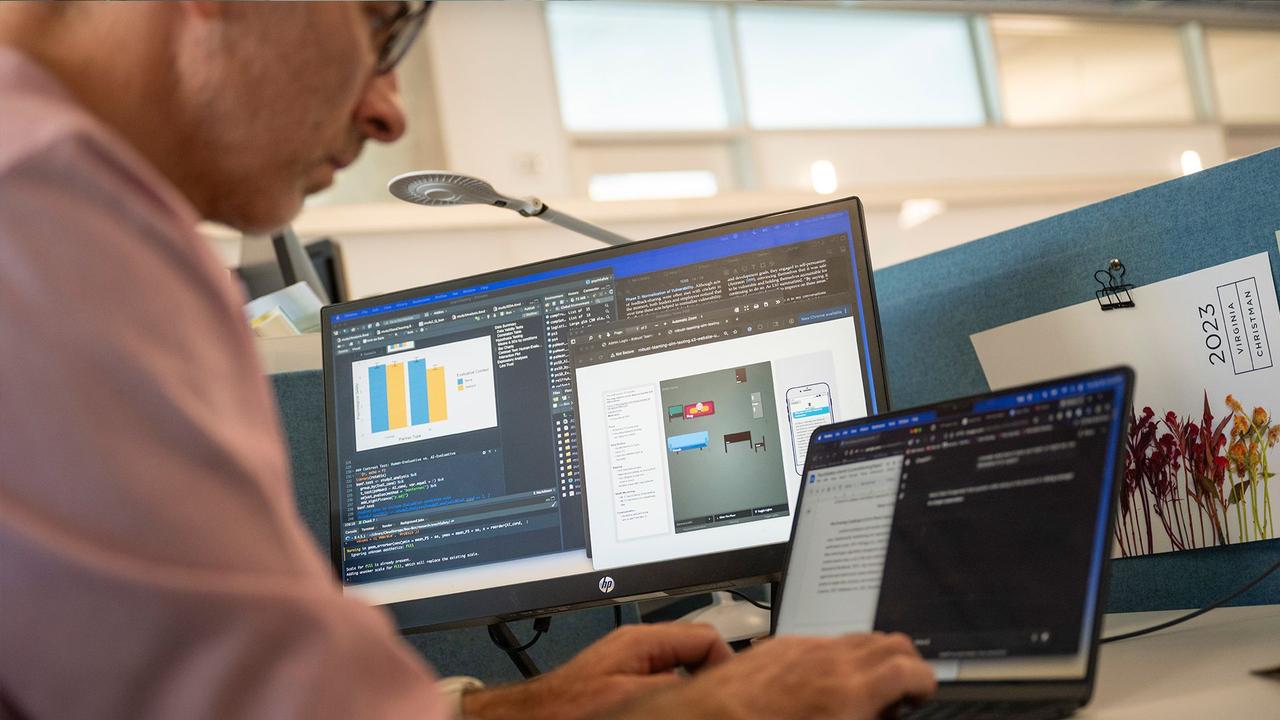AI Tools Show Promise in Enhancing Manufacturing Safety and Quality, Study Finds
2 Sources
2 Sources
[1]
How AI tools can improve manufacturing worker safety, product quality
Recent artificial intelligence advances have largely focused on text, but AI increasingly shows promise in other contexts, including manufacturing and the service industry. In these sectors, targeted AI improvements can improve product quality and worker safety, according to a new study co-authored by an interdisciplinary team of experts from the University of Notre Dame. The study, published in Information Fusion, explores how a class of AI tools capable of processing multiple types of inputs and reasoning can affect the future of work. These tools, which include ChatGPT, are known as multimodal large language models. And while most studies on AI and work have focused on office work, this new research examined production work settings, where the benefits of AI may seem less apparent. Notre Dame researchers collaborated with Indiana welding experts at the Elkhart Area Career Center, Plymouth High School, Career Academy South Bend, Plumbers & Pipefitters Local Union 172 and Ivy Tech Community College to gather images for the study, leveraging relationships cultivated through the work of the University's iNDustry Labs. Northern Indiana has one of the highest concentrations of manufacturing jobs in the United States and iNDustry Labs has collaborated with more than 80 companies in the region on more than 200 projects. Research focused on welding across several industries: RV and marine, aeronautical and farming. The study examined how accurately large language models assessed weld images to determine whether the welds shown would work for different products. Researchers found that while these AI tools showed promise in assessing weld quality, they performed significantly better analyzing curated online images compared to actual welds. "This discrepancy underscores the need to incorporate real-world welding data when training these AI models, and to use more advanced knowledge distillation strategies when interacting with AI," said co-author Nitesh Chawla, the Frank M. Freimann Professor of Computer Science and Engineering at the University of Notre Dame and the founding director of the University's Lucy Family Institute for Data and Society. "That will help AI systems ensure that welds work as they should. Ultimately, this will help improve worker safety, product quality and economic opportunity." Researchers discovered that context-specific prompts may enhance the performance of AI models in some cases, and noted that the size or complexity of the models did not necessarily lead to better performance. Ultimately, the study's co-authors recommended that future studies focus on improving models' ability to reason in unfamiliar domains. "Our study shows the need to fine-tune AI to be more effective in manufacturing and to provide more robust reasoning and responses in industrial applications," said Grigorii Khvatski, a doctoral student in Notre Dame's Department of Computer Science and Engineering and a Lucy Family Institute Scholar. Yong Suk Lee, associate professor of technology, economy and global affairs in Notre Dame's Keough School of Global Affairs and program chair for technology ethics at Notre Dame's Institute for Ethics and the Common Good, said the study's findings have important implications for the future of work. "As AI adoption in industrial contexts grows, practitioners will need to balance the trade-offs between using complex, expensive general-purpose models and opting for fine-tuned models that better meet industry needs," Lee said. "Integrating explainable AI into these decision-making frameworks will be critical to ensuring that AI systems are not only effective but also transparent and accountable." The study received funding from the U.S. National Science Foundation Future of Work program and is one of the federally funded research projects at the University of Notre Dame. In addition to Chawla, Khvatski and Lee, study co-authors include Corey Angst, the Jack and Joan McGraw Family Collegiate Professor of IT, Analytics and Operations in the University's Mendoza College of Business; Maria Gibbs, senior director of Notre Dame's iNDustry Labs; and Robert Landers, advanced manufacturing collegiate professor in Notre Dame's College of Engineering.
[2]
Federally Funded Research Explores How AI Tools Can Improve Manufacturing Worker Safety, Product Quality | Newswise
Newswise -- Recent artificial intelligence advances have largely focused on text, but AI increasingly shows promise in other contexts, including manufacturing and the service industry. In these sectors, targeted AI improvements can improve product quality and worker safety, according to a new study co-authored by an interdisciplinary team of experts from the University of Notre Dame. The study, published in Information Fusion, explores how a class of AI tools capable of processing multiple types of inputs and reasoning can affect the future of work. These tools, which include ChatGPT, are known as multimodal large language models. And while most studies on AI and work have focused on office work, this new research examined production work settings, where the benefits of AI may seem less apparent. Notre Dame researchers collaborated with Indiana welding experts at the Elkhart Area Career Center, Plymouth High School, Career Academy South Bend, Plumbers & Pipefitters Local Union 172 and Ivy Tech Community College to gather images for the study, leveraging relationships cultivated through the work of the University's iNDustry Labs. Northern Indiana has one of the highest concentrations of manufacturing jobs in the United States and iNDustry Labs has collaborated with more than 80 companies in the region on more than 200 projects. Research focused on welding across several industries: RV and marine, aeronautical and farming. The study examined how accurately large language models assessed weld images to determine whether the welds shown would work for different products. Researchers found that while these AI tools showed promise in assessing weld quality, they performed significantly better analyzing curated online images compared to actual welds. "This discrepancy underscores the need to incorporate real-world welding data when training these AI models, and to use more advanced knowledge distillation strategies when interacting with AI," said co-author Nitesh Chawla, the Frank M. Freimann Professor of Computer Science and Engineering at the University of Notre Dame and the founding director of the University's Lucy Family Institute for Data and Society. "That will help AI systems ensure that welds work as they should. Ultimately, this will help improve worker safety, product quality and economic opportunity." Researchers discovered that context-specific prompts may enhance the performance of AI models in some cases, and noted that the size or complexity of the models did not necessarily lead to better performance. Ultimately, the study's co-authors recommended that future studies focus on improving models' ability to reason in unfamiliar domains. "Our study shows the need to fine-tune AI to be more effective in manufacturing and to provide more robust reasoning and responses in industrial applications," said Grigorii Khvatski, a doctoral student in Notre Dame's Department of Computer Science and Engineering and a Lucy Family Institute Scholar. Yong Suk Lee, associate professor of technology, economy and global affairs in Notre Dame's Keough School of Global Affairs and program chair for technology ethics at Notre Dame's Institute for Ethics and the Common Good, said the study's findings have important implications for the future of work. "As AI adoption in industrial contexts grows, practitioners will need to balance the trade-offs between using complex, expensive general-purpose models and opting for fine-tuned models that better meet industry needs," Lee said. "Integrating explainable AI into these decision-making frameworks will be critical to ensuring that AI systems are not only effective but also transparent and accountable." The study received funding from the U.S. National Science Foundation Future of Work program and is one of the federally funded research projects at the University of Notre Dame. In addition to Chawla, Khvatski and Lee, study co-authors include Corey Angst, the Jack and Joan McGraw Family Collegiate Professor of IT, Analytics and Operations in the University's Mendoza College of Business; Maria Gibbs, senior director of Notre Dame's iNDustry Labs; and Robert Landers, advanced manufacturing collegiate professor in Notre Dame's College of Engineering.
Share
Share
Copy Link
A new study by University of Notre Dame researchers explores how AI tools, particularly multimodal large language models, can improve worker safety and product quality in manufacturing settings, with a focus on welding across various industries.

AI's Potential in Manufacturing: Beyond Text-Based Applications
A groundbreaking study from the University of Notre Dame has shed light on the potential of artificial intelligence (AI) to revolutionize manufacturing and service industries. While recent AI advancements have primarily focused on text-based applications, this research explores how AI tools can significantly improve product quality and worker safety in production settings
1
2
.Study Overview and Collaboration
The study, published in Information Fusion, investigates the impact of multimodal large language models - AI tools capable of processing multiple types of inputs and reasoning - on the future of work. Unlike previous studies that concentrated on office work, this research examines AI's benefits in production work environments
1
2
.Researchers from Notre Dame collaborated with Indiana welding experts from various institutions, including the Elkhart Area Career Center, Plymouth High School, and Ivy Tech Community College. This collaboration leveraged relationships cultivated through the University's iNDustry Labs, which has worked with over 80 companies in Northern Indiana, a region with one of the highest concentrations of manufacturing jobs in the United States
1
2
.Focus on Welding Across Industries
The study focused on welding applications across several industries, including RV and marine, aeronautical, and farming. Researchers examined how accurately large language models could assess weld images to determine their suitability for different products
1
2
.Key Findings and Implications
-
AI tools showed promise in assessing weld quality but performed significantly better when analyzing curated online images compared to actual welds
1
2
. -
The discrepancy in performance highlights the need to incorporate real-world welding data when training AI models and to use more advanced knowledge distillation strategies
1
2
. -
Context-specific prompts may enhance AI model performance in some cases
1
2
. -
The size or complexity of AI models did not necessarily lead to better performance
1
2
.
Recommendations for Future Research
The study's co-authors recommend that future studies focus on improving AI models' ability to reason in unfamiliar domains. They emphasize the need to fine-tune AI for more effective use in manufacturing and to provide more robust reasoning and responses in industrial applications
1
2
.Related Stories
Implications for the Future of Work
As AI adoption in industrial contexts grows, practitioners will need to balance the trade-offs between using complex, expensive general-purpose models and opting for fine-tuned models that better meet industry needs. The integration of explainable AI into decision-making frameworks will be crucial to ensure that AI systems are not only effective but also transparent and accountable
1
2
.Funding and Research Team
The study received funding from the U.S. National Science Foundation Future of Work program. The research team included experts from various disciplines at the University of Notre Dame, such as computer science, engineering, business, and global affairs
1
2
.This federally funded research represents a significant step forward in understanding how AI can be applied to improve manufacturing processes, worker safety, and product quality, potentially reshaping the future of industrial work.
References
Summarized by
Navi
Related Stories
Study Reveals Challenges in AI Adoption for Safety-Critical Settings
19 Aug 2025•Technology

AI's Impact on Worker Well-being: Early Study Reveals Surprising Benefits and Cautionary Notes
23 Jun 2025•Science and Research

Enterprise AI adoption reveals 6x productivity gap between power users and typical workers
10 Dec 2025•Business and Economy

Recent Highlights
1
ByteDance's Seedance 2.0 AI video generator triggers copyright infringement battle with Hollywood
Policy and Regulation

2
Demis Hassabis predicts AGI in 5-8 years, sees new golden era transforming medicine and science
Technology

3
Nvidia and Meta forge massive chip deal as computing power demands reshape AI infrastructure
Technology





